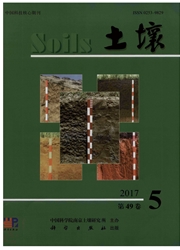

 中文摘要:
中文摘要:
从土壤中分离筛选出一株对番茄青枯病病原菌有较强抑菌效果的菌株N5,经生理生化及16SrRNA基因序列分析,将菌株N5初步鉴定为甲基营养型芽孢杆菌(Bacillus methylotrophicus)。菌株N5具有产生铁载体、β-1,3-葡聚糖酶、纤维素酶、蛋白酶以及多种脂肽类抗菌物质的能力。菌体发酵后与有机肥(猪粪:氨基酸肥料=1:1)混合后进行二次发酵制成生物有机肥,并用盆栽试验验证其生防和促生效果。结果表明:利用菌株N5制备的生物有机肥可以促进番茄的生长,提高根系的活力。生物有机肥可有效防治番茄青枯病,其中营养钵使用生物有机肥的处理其生防效果优于大盆使用生物有机肥的处理,特别是营养钵和大盆均使用生物有机肥的处理其生防效果达69%,而使用有机肥并不能有效防治番茄青枯病。使用生物有机肥显著增加根际土壤中细菌、放线菌的数量,减少真菌和青枯劳尔氏菌的数量。
 英文摘要:
英文摘要:
A bacterial strain N5, showing strong antagonistic activity against Ralstonia solanacearum was isolated from soil Strain N5 was primarily identified as Bacillus methylotrophieus based on its biochemical and physiological characteristics and 16S rRNA gene sequence analysis. Strain N5 could produce siderophores, β-1,3-glucanase, cellulase and protease, and also had ability to produce some lipopeptide antibacterial substances. Strain N5 was inoculated into organic fertilizer (pig manure : amino acid fertilizer = 1 : 1) to ferment 4 days to make bio-organic fertilizer. Bio-organic fertilizer was estimated by pot experiment for its biocontrol capacity to tomato bacterial wilt disease. The results demonstrated that application of bioorganic fertilizer could significantly promote tomato growth and increased root activity. Application of bioorganic fertilizer could effectively biocontrol tomato bacterial wilt disease. The control efficiency of treatments in which bioorganic fertilizer was applied only in nursery was higher than that in treatments in which bioorganic fertilizer was applied only in pot soil. Application of bioorganic fertilizer both in nursery and pot soil could much more effectively biocontrol tomato bacterial wilt disease with efficiency of 69%, but common organic fertilizer could not control tomato bacterial wilt disease. Application of bioorganic fertilizer could significantly increase the number of bacteria and actinomyees and reduce the number of fungi and Ralstonia solanacearum in rhizosphere soil compared to control.
 同期刊论文项目
同期刊论文项目
 同项目期刊论文
同项目期刊论文
 期刊信息
期刊信息
